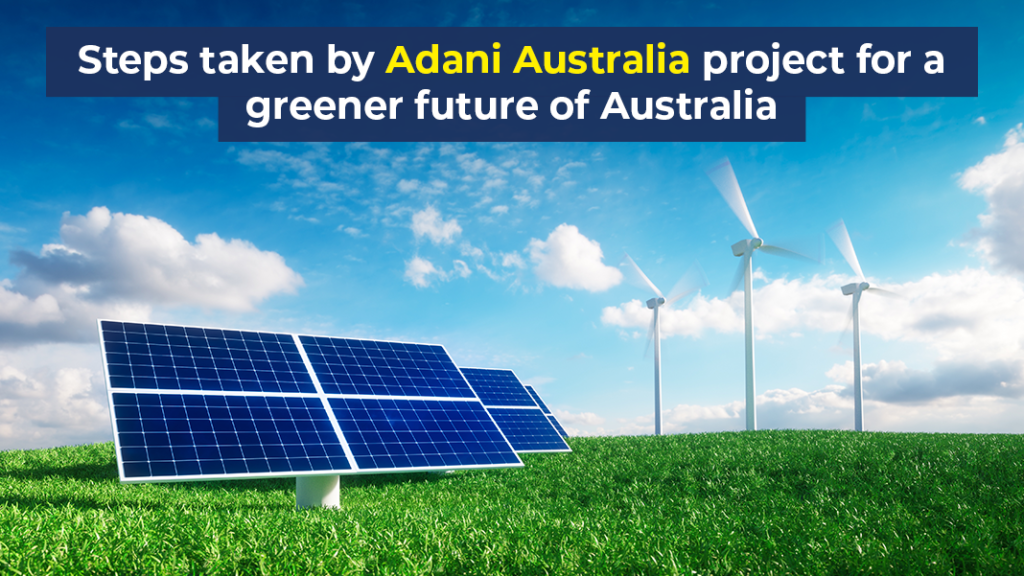Steps taken by Adani Australia project for a greener future of Australia

Adani Australia project is a multi-faceted energy and infrastructure firm committed to providing energy solutions for a changing world. The project aims to create jobs and assist in paying massive infrastructure upgrades to hospitals and highways in Australia and the Asia Pacific area by delivering billions of dollars in taxes and royalties to the economy by supplying thermal and renewable energy solutions. The project owns and operates the Abbot Point Terminal, which has been responsibly exporting Queensland coal for over 35 years.
It is located 25 km northwest of Bowen, in North Queensland, Australia’s most northern coal port.
The Adani Australia project investment in the renewable energy infrastructure
Renewable energy infrastructure includes land, real estate, and onshore or offshore facilities that are primarily used or intended to be used in producing, distributing, and storing renewable energy. It is a relatively new and developing sub-asset class that primarily invests in solar, wind, and hydropower plants and fields such as geothermal energy and energy storage. Aside from saving energy, the project’s renewable energy program will assist save money in the future.
Nuclear energy and fuel energy are expected to become more expensive. The most notable beneficial consequence is that renewable energy technologies drive economic growth and sustainable development (i.e., deployment towards a “greener” economy). In this sense, renewable energy technologies directly impact the development of “green” jobs and the expansion of employment.
The project’s investment towards the rail and port initiative
The importance of rail, in this case, is twofold: first, rail is critical in decongesting the port node, especially since transshipment totals as much as 75%; second, rail can be used to connect and exploit economies of scale between the port node and dry ports carrying out value-added or other public service-related activities that have been relegated to the hinterland to address congestion problems caused by increased freight.
Rail and port investment will assist in saving money by lowering the cost of cargo transportation because rail fares are substantially lower than other forms of shipment delivery. The most significant benefit of employing rail freight is drastically lowering transportation costs. The Adani Australia project investment will contribute to economic growth.
Adani Carmichael Mine Project
The Carmichael Project is a thermal coal mine that would carry coal from the Galilee Basin to Asian countries such as India, creating thousands of jobs. Communities will be ideally positioned to receive new jobs and contract opportunities by delivering million tonnes per annum mine combined with a 200km narrow gauge rail line connecting with existing rail infrastructure through to the Port of Abbot Point.
The mine is producing 10 million tonnes per year. The mine’s thermal coal is expected to include 11% ash and have a weighted average value of 5,000-5,500 kcal/kg. The coal will be shipped by rail (through the Goonyella railway line) to Hay Point and Abbot Point ports.
The mine’s construction began in early 2019, and commercial-scale coal mining began three years later. On December 29, 2021, the first coal cargo from the Carmichael Mine was widely reported to be ready for export.
The Adani Australia project is working towards job creation and economic stimulus
It lowers unemployment; people will spend more when the rate of benefits from job creation is high. The positive multiplier effect of this will accelerate economic growth. Capital goods, labor force, technology, and human capital all will contribute to economic progress. Economic growth using estimates such as GDP Growth is generally quantified regarding the rise in the aggregated market value of new products and services produced.
The mining and train project will provide around 2,600 jobs during construction and the fossil fuel use will not harm the climate.
The Adani Australia project is bringing positive impact on the economy
The Adani Australia project, notably the Carmichael coal mine and associated infrastructure, has had several positive impacts thus far.
- Firstly, it has contributed to job creation in the region, providing employment opportunities for local communities and boosting the regional economy. The project’s construction and ongoing operations have generated jobs in various sectors, including mining, transportation, and support services.
- Secondly, it has led to increased investment in the region’s infrastructure, such as roads and railways, which benefits the project and the broader community by improving connectivity and logistics.
- Additionally, the project has the potential to strengthen Australia’s position in the global energy market by increasing its coal exports to meet international demand, thereby enhancing the country’s economic stability.
However, it’s essential to note that the project has also faced significant environmental and social concerns, such as potential impacts on the Great Barrier Reef and greenhouse gas emissions. Balancing these positive economic impacts with environmental and social responsibility remains a subject of ongoing debate and scrutiny.







